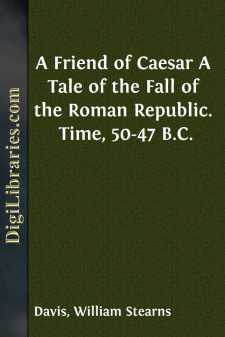Fiction
- Action & Adventure 180
- Biographical 15
- Christian 59
- Classics 6965
- Coming of Age 5
- Contemporary Women 3
- Erotica 8
- Espionage/Intrigue 12
- Fairy Tales, Folklore & Mythology 236
- Family Life 169
- Fantasy 117
- Gay 1
- General 596
- Ghost 32
- Historical
- Horror 43
- Humorous 160
- Jewish 25
- Legal 4
- Medical 22
- Mystery & Detective 315
- Political 49
- Psychological 41
- Religious 64
- Romance 159
- Sagas 11
- Science Fiction 730
- Sea Stories 113
- Short Stories (single author) 537
- Sports 10
- Suspense 1
- Technological 8
- Thrillers 2
- Urban Life 31
- Visionary & Metaphysical 1
- War & Military 173
- Westerns 199
Historical Books
Sort by:
CHAPTER I THE POLKINGTONS The Polkingtons were of those people who do not dine. They lunched, though few besides Johnny Gillat, who did not count, had been invited to share that meal with them. They took tea, the daintiest, pleasantest, most charming of teas, as the élite of Marbridge knew; everybody—or, rather, a selection of everybody, had had tea with them one time or another. After that there...
more...
A GOOD SAMARITAN The little District Telegraph boy, with a dirty face, stood at the edge of the desk, and, rubbing his sleeve across his cheek, made it unnecessarily dirtier. "Answer, sir?" "No—yes—wait a minute." Reed tore the yellow envelope and spread the telegram. It read: "Do I meet you at your office or at Martin's and what time?" "The devil!" Reed...
more...
by:
Emerson Hough
CHAPTER I THE BRAZEN TONGUES The band major was a poet. His name is lost to history, but it deserves a place among the titles of the great. Only in the soul of a poet, a great man, could there have been conceived that thought by which the music of triumph should pass the little pinnacle of human exultation, and reach the higher plane of human sympathy. Forty black horses, keeping step; forty...
more...
We must ask pardon of the public for offering it this book, and give it due warning of what it will find therein. The public loves fictitious novels! this is a true novel. It loves books which make a pretence of introducing their readers to fashionable society: this book deals with the life of the street. It loves little indecent books, memoirs of courtesans, alcove confessions, erotic obscenity, the...
more...
THE LINGUISTER The mental image of the world is of individual and varying compass. It may be likened to one of those curious Chinese balls of quaintly carved ivory, containing other balls, one within another, the proportions ever dwindling with each successive inclosure, yet each a more minute duplicate of the external sphere. This might seem the least world of all,—the restricted limits of the...
more...
Præneste I It was the Roman month of September, seven hundred and four years after Romulus—so tradition ran—founded the little village by the Tiber which was to become "Mother of Nations," "Centre of the World," "Imperial Rome." To state the time according to modern standards it was July, fifty years before the beginning of the Christian Era. The fierce Italian sun was...
more...
CHAPTER I. THE PORTE ST. ANTOINE. On the 26th of October, 1585, the barriers of the Porte St. Antoine were, contrary to custom, still closed at half-past ten in the morning. A quarter of an hour after, a guard of twenty Swiss, the favorite troops of Henri III., then king, passed through these barriers, which were again closed behind them. Once through, they arranged themselves along the hedges, which,...
more...
CHAPTER I. MALBROUCK S'EN VA-T'EN GUERRE. "So adieu, Jack, until we meet in Quebec! You have the start of us, report says, and this may even find you drinking his Majesty's health in Fort Carillon. Why not? You carry Howe, and who carries Howe carries the eagles on his standards; or so you announce in your last. Well, but have we, on our part, no vexillum? Brother Romulus presents...
more...
It must be a spirit much unlike my own, which can keep itself in health and vigor without sometimes stealing from the sultry sunshine of the world, to plunge into the cool bath of solitude. At intervals, and not infrequent ones, the forest and the ocean summon meâone with the roar of its waves, the other with the murmur of its boughsâforth from the haunts of men. But I must wander many a...
more...
THE ETHICS OF GEORGE ELIOT’S WORKS. “There is in man a higher than love of happiness: he can do without happiness, and instead thereof find blessedness.” Such may be regarded as the fundamental lesson which one of the great teachers of our time has been labouring to impress upon the age. The truth, and the practical corollary from it, are not now first enunciated. Representing, as we believe...
more...











